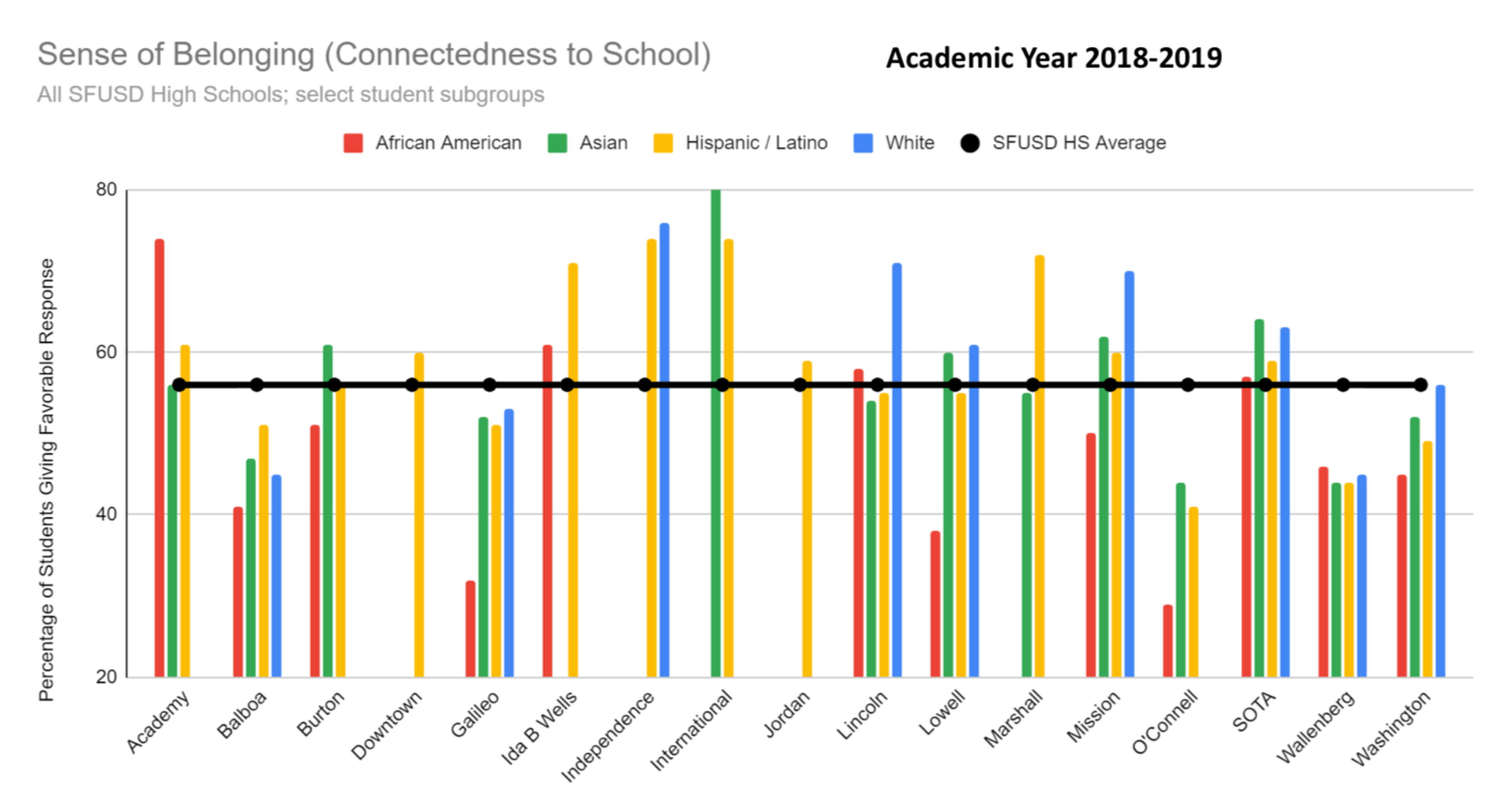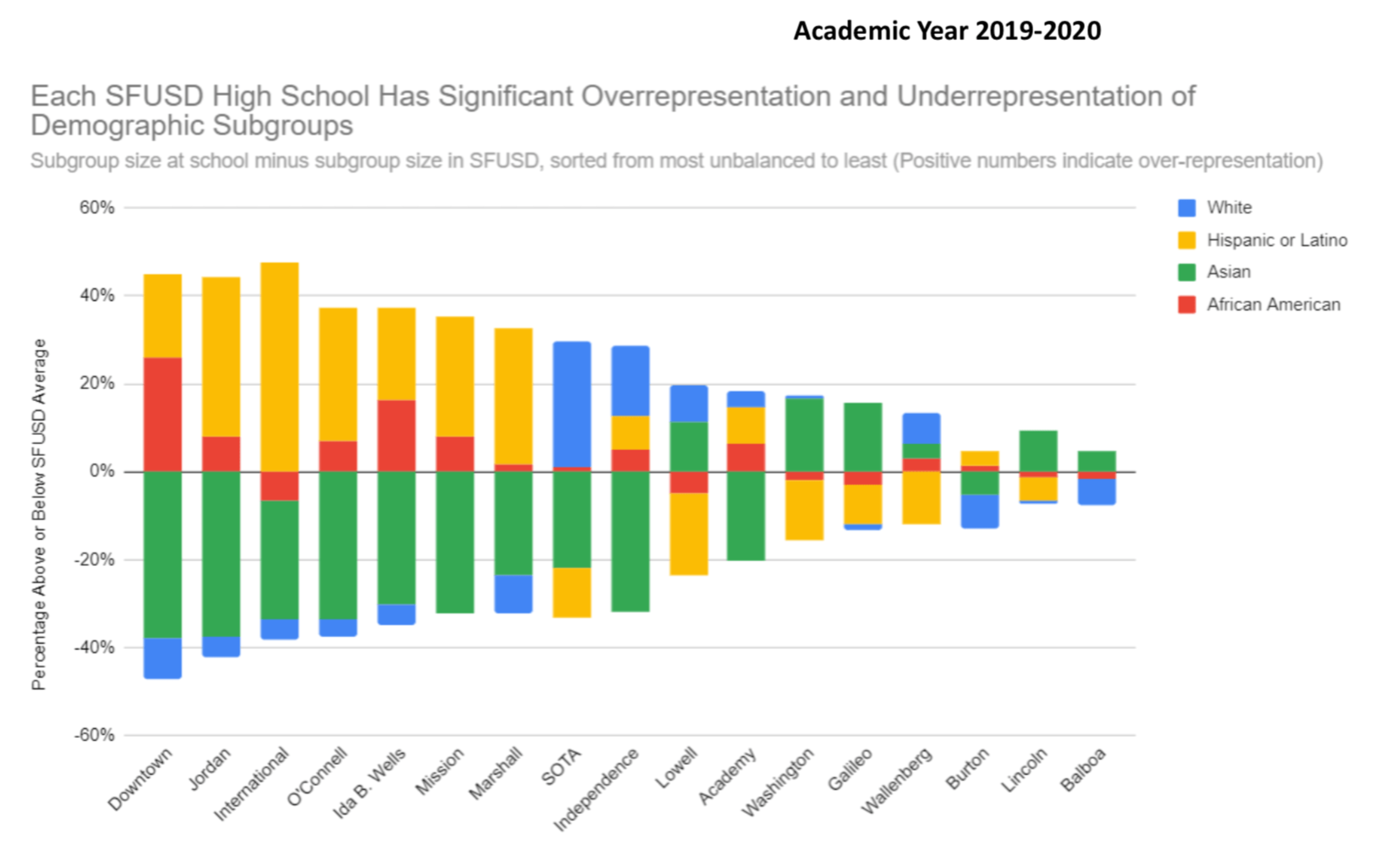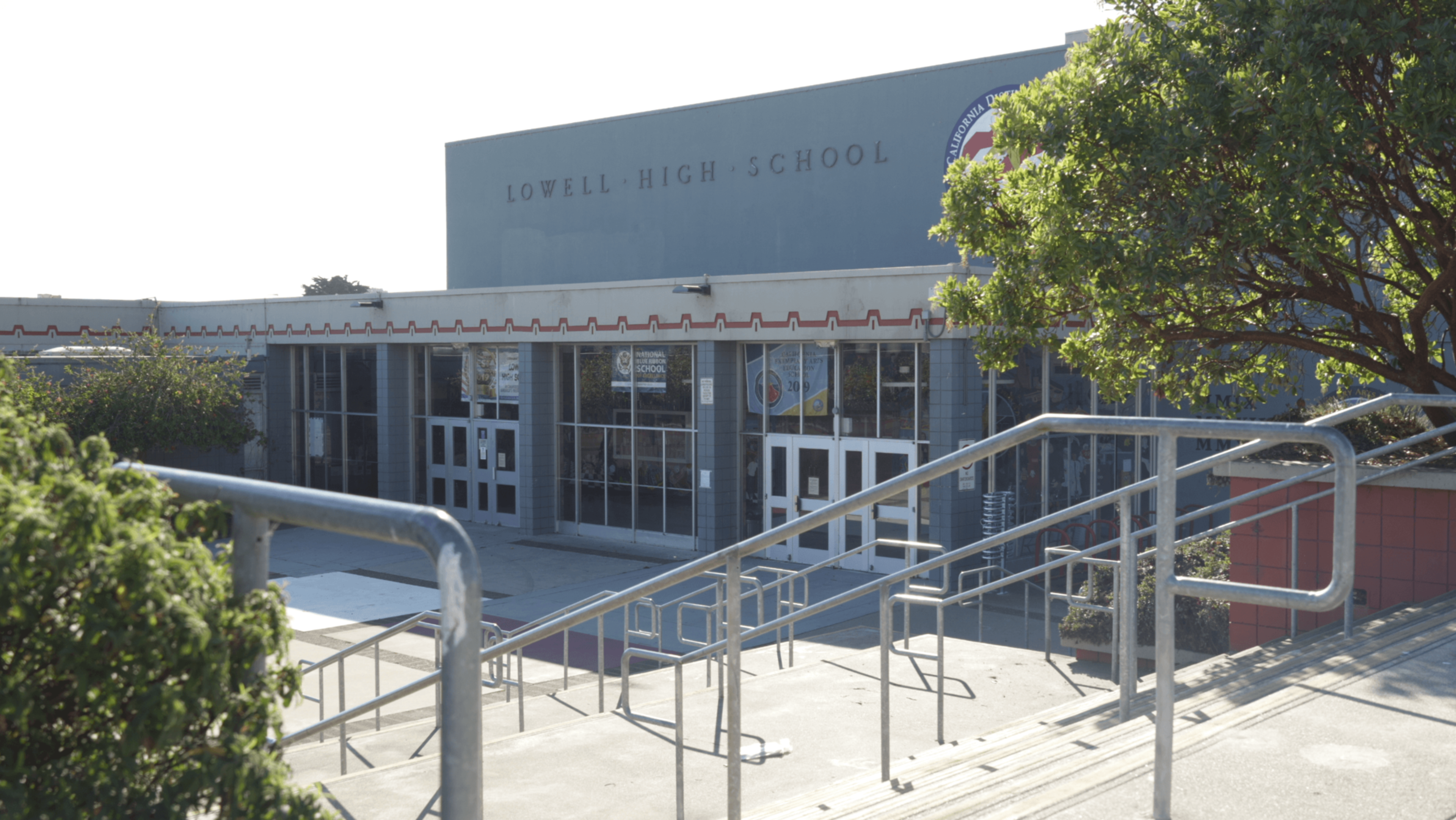It’s been a rollercoaster few months for academically competitive Lowell High School (opens in new tab). In January, it became one of 44 schools (opens in new tab) slated for renaming by the San Francisco Unified School District (SFUSD (opens in new tab)). That same month, racist and anti-Semitic messages posted on a virtual bulletin board rocked the school’s campus (opens in new tab). This week, its merit-based admissions process could be permanently replaced (opens in new tab) by a lottery system.
Now, a new analysis (opens in new tab) from advocacy group Families for San Francisco (opens in new tab) raises questions about whether the change to Lowell’s admissions criteria is being pushed through too quickly without careful analysis of already-existing data.
The divisive admissions proposal (opens in new tab) heads to the school board today for a vote.
The school board submitted the fast-tracked resolution (opens in new tab) in response to what they identify as ongoing and pervasive issues of racism and equity at Lowell. The resolution states that “Black, Latinx, and Samoan Pacific Islander students in SFUSD often express concern they do not feel physically, emotionally or culturally safe and valued at Lowell.” It also says Lowell’s merit-based admissions process has created a school that does “not reflect the diversity of SFUSD students.”
Less than two percent of Lowell’s students are Black, and less than 12 percent are Hispanic or Latino. Overall, Black students comprise almost eight percent of SFUSD’s student population, and Latino/Hispanic students comprise 32 percent. Samoan Pacific Islander students are also underrepresented at Lowell, while white and Asian students are overrepresented.
Families for San Francisco’s preliminary analysis, which uses data from SFUSD’s annual Culture/Climate survey (opens in new tab) and the California Department of Education (opens in new tab), shows a bird’s eye view of culture and demographic issues across SFUSD’s high schools.
The SFUSD Culture/Climate survey tracks how San Francisco’s students of various demographics perceive the schools that they attend. As part of the survey, SFUSD students mark whether they feel favorably or unfavorably towards 1) a “Climate of Support for Academic Learning,” 2) “Knowledge and Fairness of Discipline, Rules and Norms,” 3) a sense of “Safety” and 4) a “Sense of Belonging (School Connectedness)” at their school.
From the Families for San Francisco analysis—which the group emphasizes is meant to elicit a discussion rather than provide any definitive answers—it appears that Black students report Culture/Climate scores that are lower than the average at the majority of high schools and across all four categories. The report tallies responses from SFUSD’s 2018-2019 school year survey and only looks at high schools.
“This kind of analysis,” said the report’s author Patrick Wolff, a Lowell parent and co-founder of Families for San Francisco, “does seem to help inform what the issues at Lowell are and how to contextualize them throughout the rest of SFUSD.” The group emphasized in an email that its analysis is “only one small piece of a complicated mosaic. …There are many complicated issues involved and many perspectives to consider.”
In the analysis’ evaluation of student responses to the “Safety” category, there is no high school in the SFUSD system at which the score for Black students is significantly above the reported average. At Lowell, Black students report “the lowest sense of safety among demographic subgroups… with scores slightly below the SFUSD HS average,” reads the analysis. (Recently, the Lowell Black Student Union released a list of 23 demands (opens in new tab), including the removal of Lowell principal Dacotah Swett at the end of the 2020–2021 school year for “failure to ensure a safe learning environment for Lowell students.”) Meanwhile, Asian and Latino students’ sense of safety is above average at Lowell but below average at schools like Marshall, O’Connell and Wallenberg, according to the analysis. Aside from two outliers, Downtown and Independence, no SFUSD high school meets the average for “Safety” for all demographics.
Black students report a significantly lower score for “Sense of Belonging” at Lowell than most other high schools; only O’Connell and Galileo score lower. Six of SFUSD’s high schools rank below average for “Sense of Belonging” for both Asian and Latino students. In the survey, “Sense of Belonging” is described as “a positive sense of being accepted, valued, and included, by others (teachers and peers) in all school settings.”

The Families for San Francisco report also analyzes the demographic breakdown of SFUSD’s high schools. Its analysis suggests that most of them have significant overrepresentation and underrepresentation by demographic category. Lowell falls in the middle of overall demographic imbalance.
“Most of the schools are not representative. It was very eye-opening to me just to see graphically just how concentrated different racial demographic groups are at different schools,” said Wolff.

Families for San Francisco opposes fast-tracking a change in Lowell’s admissions criteria, instead hoping the SFUSD will conduct research similar to—but even more comprehensive than—its preliminary analysis.
“We think it’s a very legitimate question whether the merit-based admissions criteria at Lowell best serves the school district,” said Wolff. “But it’s hard to understand how this could be a decision that’s been well-informed given how quickly the process is for proposing and implementing it,” he said.
“We think that [SFUSD] should take a careful look at their own data on the culture and climate across various schools. They collect this data; surely they’re interested in it,” Wolff added.
The school board recently accelerated a process (opens in new tab) to rename 44 schools, including ones named after Abraham Lincoln and George Washington. An earlier Families for San Francisco report (opens in new tab) found that the process was “deeply flawed” and rife with errors, including a recommendation to remove Paul Revere’s name because he was said to be connected to the colonization of Native American lands. (He was not.) The renaming committee did not consult historians and cites (opens in new tab) Wikipedia and History.com as some of the sources for its research.
Lowell has already switched (opens in new tab) its admissions criteria to random lottery for next year’s freshman class because of the pandemic, meaning there’s time for more analysis for future class years should the board choose to conduct it.
Supervisor Gordon Mar, who represents District 4 and is a Lowell parent, supports the majority of the resolution but says that the decision to change Lowell’s admissions criteria shouldn’t be hurried.
“I fully support the demands by the Black Student Union, the African American community, and others for immediate action to address the racism and hostile environments at Lowell for Black and brown students and also to address the lack of racial diversity,” Mar said.
“But I do not support the immediate and quite drastic change to the Lowell admission policy,” he added. “I think that should be done in a more thoughtful and inclusive way and going through a real process. Changes in the admissions policy could just be one way to address these important issues alongside other strategies as well, including perhaps more proactive outreach to underrepresented communities and schools, not just at the middle school level but even at the elementary school level.”
California Assemblymember Phil Ting, whose district includes Lowell High School, released a statement (opens in new tab) opposing the resolution ahead of today’s board vote: “Rather than eliminating Lowell’s merit-based admissions policy, let’s continue to reshape its culture and replicate its academic success across all of SFUSD’s high schools, so every student has the necessary tools to follow their dreams.”
Nicole Henares, a Lowell English teacher, called into public comment on Feb. 2 to voice her support (opens in new tab) of the resolution. “As far as merit-based admission to Lowell, I say this: Any student who wants to learn how to write, I will teach them. I don’t care what their test scores are.”
Requests for comment from the school board were not returned.
UPDATE: On Feb. 9, the San Francisco Board of Education voted 5-2 to permanently switch Lowell High School’s merit-based admissions criteria to a lottery system. Board members Mark Sanchez, Gabriela López, Matt Alexander, Alison Collins and Faauuga Moliga voted in favor of the resolution, while board members Jenny Lam and Kevine Boggess voted against it. Video of the Feb. 9 meeting can be watched here (opens in new tab).
